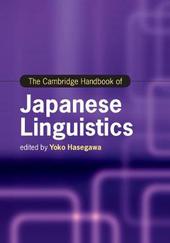
|
The Cambridge Handbook of Japanese Linguistics
Hardback
Main Details
| Title |
The Cambridge Handbook of Japanese Linguistics
|
| Authors and Contributors |
Edited by Yoko Hasegawa
|
| Series | Cambridge Handbooks in Language and Linguistics |
|---|
| Physical Properties |
| Format:Hardback | | Pages:786 | | Dimensions(mm): Height 255,Width 183 |
|
| Category/Genre | linguistics
Sociolinguistics |
|---|
| ISBN/Barcode |
9781107185456
|
| Classifications | Dewey:495.6 |
|---|
| Audience | | Professional & Vocational | |
|---|
| Illustrations |
Worked examples or Exercises; 47 Tables, black and white; 5 Maps; 26 Halftones, black and white; 25 Line drawings, black and white
|
|
Publishing Details |
| Publisher |
Cambridge University Press
|
| Imprint |
Cambridge University Press
|
| Publication Date |
19 April 2018 |
| Publication Country |
United Kingdom
|
Description
The linguistic study of Japanese, with its rich syntactic and phonological structure, complex writing system, and diverse sociohistorical context, is a rapidly growing research area. This book, designed to serve as a concise reference for researchers interested in the Japanese language and in typological studies of language in general, explores diverse characteristics of Japanese that are particularly intriguing when compared with English and other European languages. It pays equal attention to the theoretical aspects and empirical phenomena from theory-neutral perspectives, and presents necessary theoretical terms in clear and easy language. It consists of five thematic parts including sound system and lexicon, grammatical foundation and constructions, and pragmatics/sociolinguistics topics, with chapters that survey critical discussions arising in Japanese linguistics. The Cambridge Handbook of Japanese Linguistics will be welcomed by general linguists, and students and scholars working in linguistic typology, Japanese language, Japanese linguistics and Asian Studies.
Author Biography
Yoko Hasegawa is Professor of Japanese Linguistics, in the Department of East Asian Languages and Cultures at the University of California, Berkeley. Her research interests range over the great diversity of Japanese linguistics. Her publications include: Japanese: A Linguistic Introduction (Cambridge, 2014), Soliloquy in Japanese and English (2010) and Nihongo kara mita nihonjin: Shutaisei no gengogaku, with Yukio Hirose (2010).
Reviews'The Japanese language is of great interest not only because of the unique position Japan holds in the world, by virtue of her history, culture, science and technology. It also has great importance because it has attracted the attention of many distinguished linguists, whose publications on it over many decades have influenced the development of linguistic theory itself. This Handbook is a balanced and comprehensive anthology of the many achievements of the field, presented by leading experts. It is much to be welcomed by Japanologists as well as by linguists at large.' William Shiyuan Wang, Chair Professor of Language and Cognitive Sciences, Hong Kong Polytechnic University 'In summary, [The Cambridge Handbook of Japanese Linguistics] serves as an excellent reference book for both established and aspiring linguists ... All in all, the editor, Yoko Hasegawa, as well as the 27 other contributors recruited from around the world, should be congratulated and thanked for their excellent work in producing this impressive handbook.' Junko Mori, The Journal of Japanese Studies
|